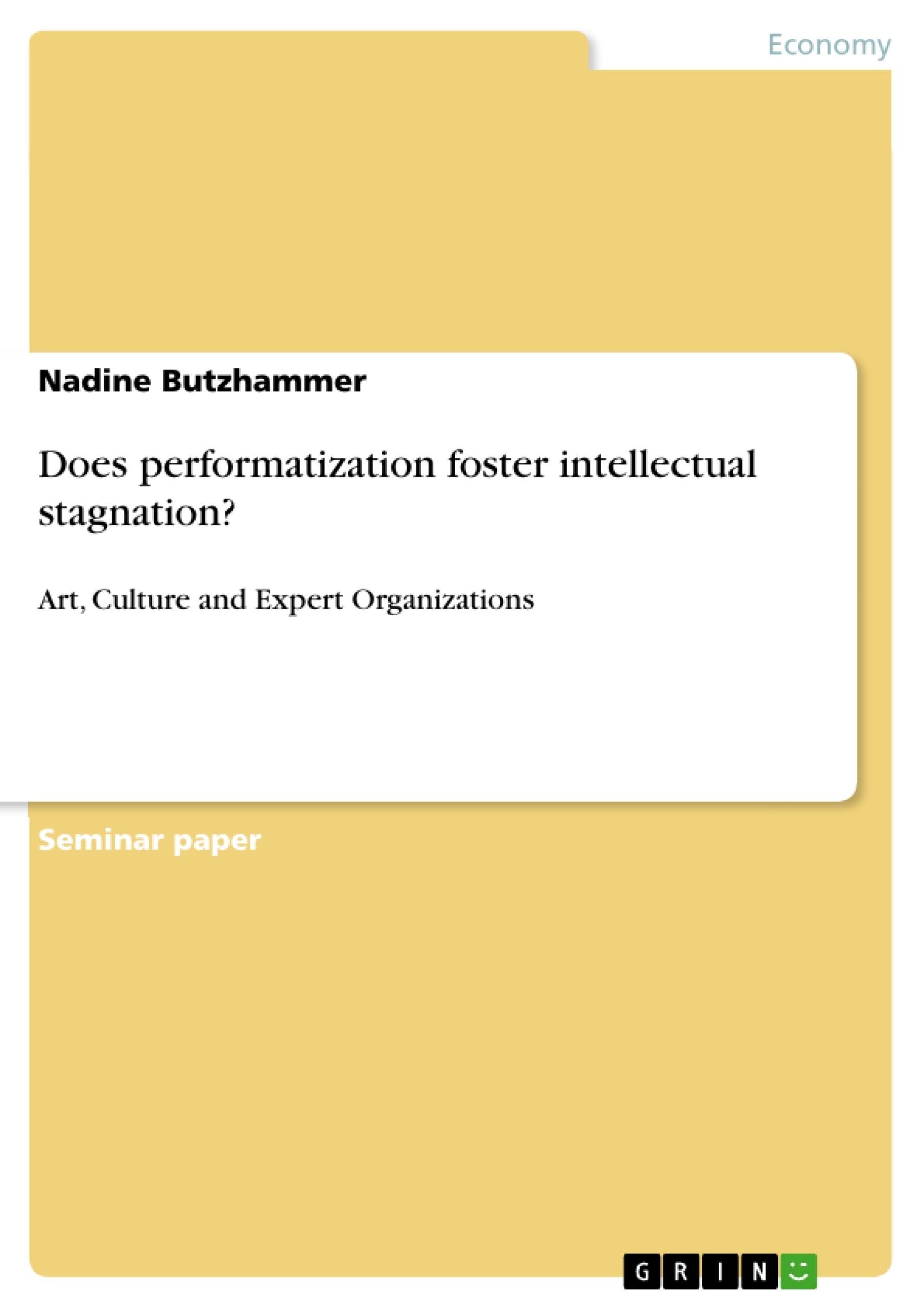"While it may be reasonable to believe that a lack of institutional incentives is detrimental in terms of research productivity, a sophisticated and intrusive system of rewards and surveillance focused on performance measurement may stifle innovation […].“
The above statement by Gendron (2008) raises the question: How much is too much? The present seminar thesis shall explain, in which status of performance thinking accompanied by rewards the higher education sector is situated and which implications follow out of this for research activities of universities in particular.
Concretely, the research question „Does performatization foster intellectual stagnation“ shall be examined. For this purpose, a literature study has been operated, which encompasses inter alia renowned authors like Alvesson, Gendron, Hopwood, Humphrey, Parker and Sandberg.
The seminar thesis is set up as follows: It starts with a brief overview about the presence of performance thinking in academia and its emergence. Thereupon, the actual main part follows which deals with the examination of the consequences triggered by performativity. After limiting the thesis to the university’s activity of research and more precisely to the performance indicator of journal rankings in particular, firstly positive consequences and subsequently negative consequences are examined. As a next step, change attempts and resistance against the performativity movement in general and against specific consequences out of it are introduced. In the final discussion chapter, the previous findings are illuminated from different angels and in this course also reflected and brought into wider context. The seminar thesis ends with a short summary of the outcomes and a personal notation of the author.
Inhaltsverzeichnis (Table of Contents)
- Introduction
- The emergence of performativity in academia
- Consequences of academia's performativity
- Limitation to research and its performance indicator of journal rankings
- Positive consequences
- Negative consequences
- Careerism
- Conformity
- Gap spotting research and puzzle solving
- Internationalization
- Lacking practical linkage
- Researcher identity
- Readership
- Power asymmetry
- Summary and differentiation
- Resistance and attempts of change
- Rethinking
- Institutional arrangements
- Individual Actions
- Discussion
Zielsetzung und Themenschwerpunkte (Objectives and Key Themes)
This seminar thesis investigates the impact of performativity on intellectual stagnation in the higher education sector. It examines the emergence of performance thinking in academia and its consequences for research activities, focusing particularly on the performance indicator of journal rankings. The thesis delves into both positive and negative effects of performativity, considering its impact on careerism, conformity, and researcher identity. It also explores attempts to resist and change the performativity movement within academia.
- The emergence and evolution of performativity in academia
- The consequences of performativity for research, particularly in relation to journal rankings
- Positive and negative impacts of performativity on academic practices
- Resistance and attempts to change the performativity movement in academia
- The influence of performativity on researcher identity and intellectual freedom
Zusammenfassung der Kapitel (Chapter Summaries)
The introduction sets the stage by presenting the research question and outlining the thesis's structure. The second chapter explores the emergence of performativity in academia, tracing its roots in the New Public Management movement and its impact on university funding, structure, and practices. It highlights the shift towards a KPI mentality and the increased focus on measurable outcomes.
Chapter three delves into the consequences of performativity for research, particularly focusing on the performance indicator of journal rankings. It examines both positive and negative aspects of this trend, including its impact on career advancement, conformity, and researcher identity. The chapter also discusses how performativity can lead to a focus on "gap spotting" research and a potential disconnect from practical applications.
Chapter four explores attempts to resist and change the performativity movement in academia. It discusses various approaches, such as rethinking the current evaluation system, implementing institutional changes, and encouraging individual actions.
Schlüsselwörter (Keywords)
This seminar thesis explores the concepts of performativity, intellectual stagnation, higher education, research, journal rankings, KPI mentality, new public management, neo-institutionalism, neoliberalism, careerism, conformity, researcher identity, and resistance to performativity.
Frequently Asked Questions
What is "performativity" in academia?
It refers to the shift towards a "KPI mentality" where research and teaching are measured by quantifiable indicators like journal rankings and funding metrics.
Does performatization lead to intellectual stagnation?
The thesis argues that intrusive surveillance and reward systems focused on performance can stifle innovation and discourage risky, groundbreaking research.
What are the negative consequences of journal rankings?
Negative impacts include careerism, conformity to popular topics, a focus on "gap-spotting" rather than real-world problems, and a loss of academic freedom.
How does performativity affect researcher identity?
Researchers may begin to see themselves as "producers" of metrics rather than seekers of truth, leading to a disconnect from the practical and social value of their work.
Are there ways to resist this movement?
Yes, the paper discusses rethinking evaluation systems, institutional changes, and individual actions to prioritize quality and relevance over pure metrics.
- Citation du texte
- Nadine Butzhammer (Auteur), 2018, Does performatization foster intellectual stagnation?, Munich, GRIN Verlag, https://www.grin.com/document/538599



